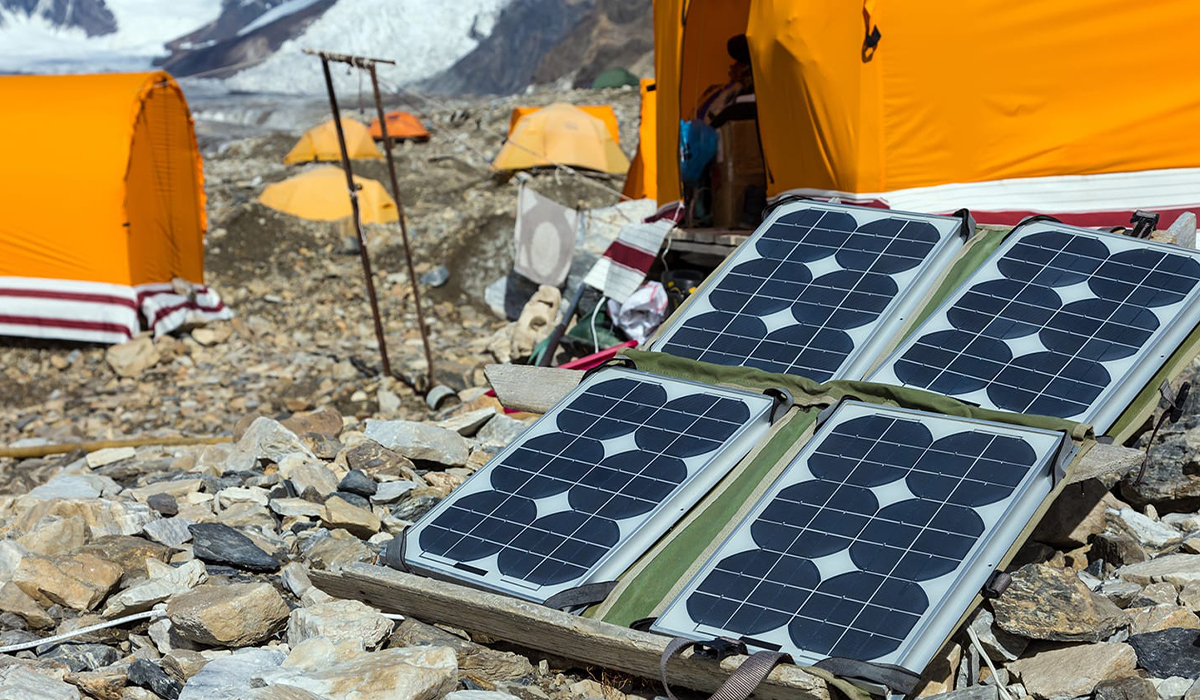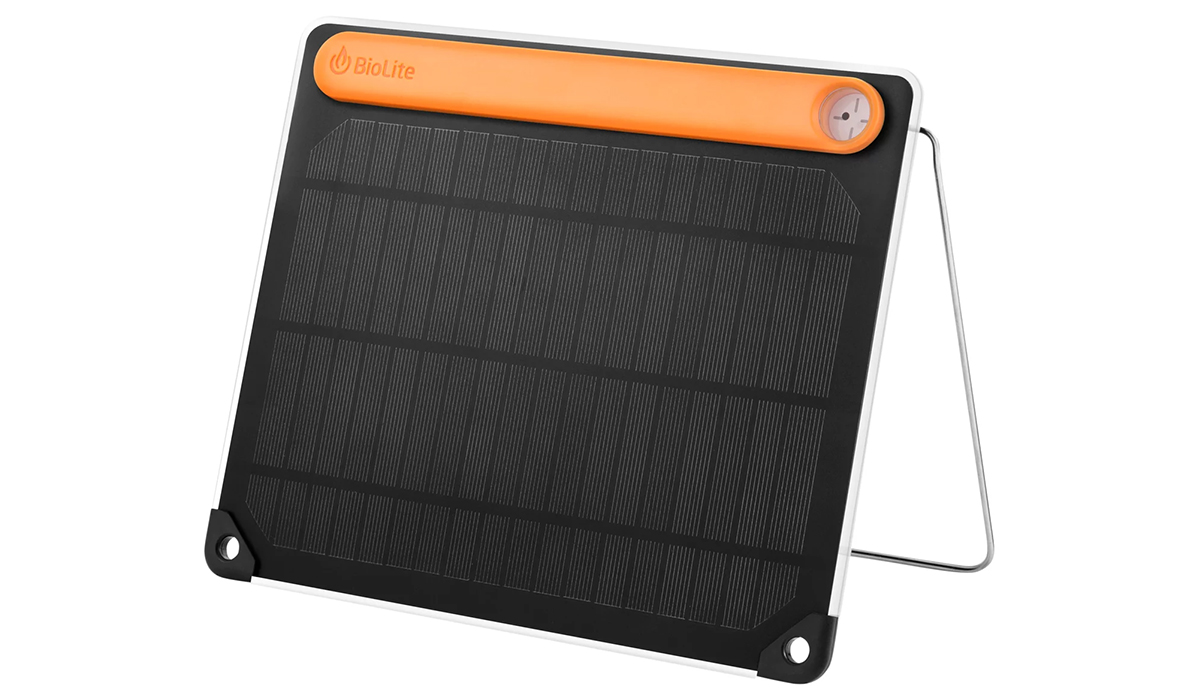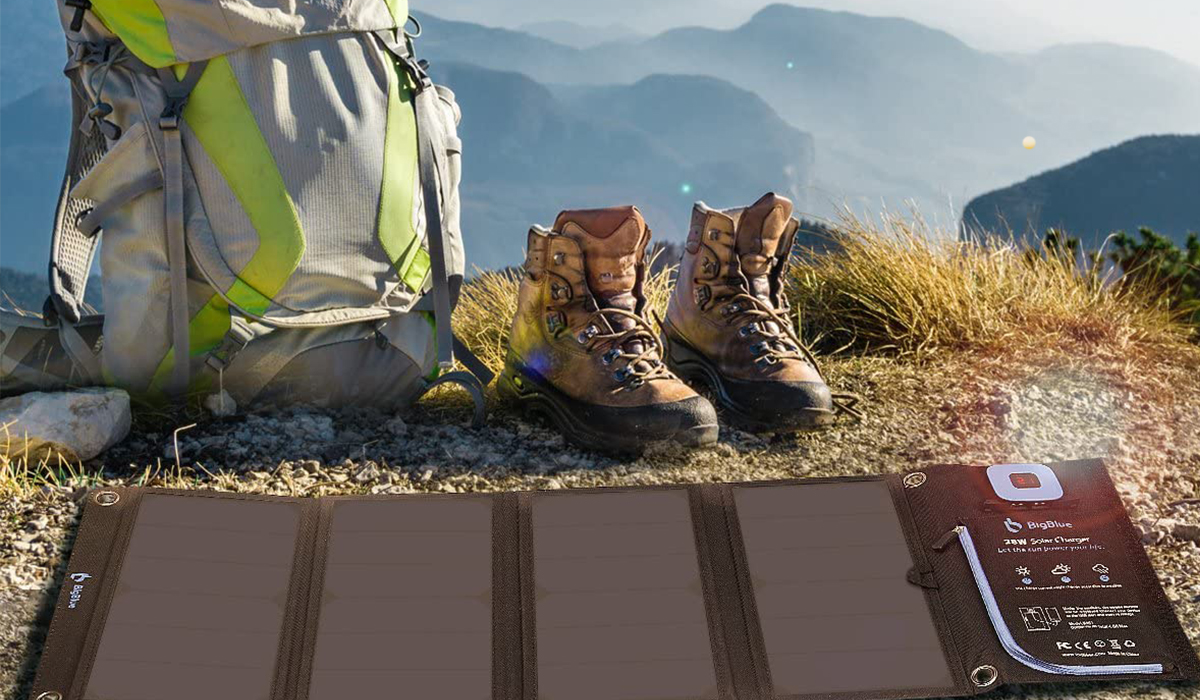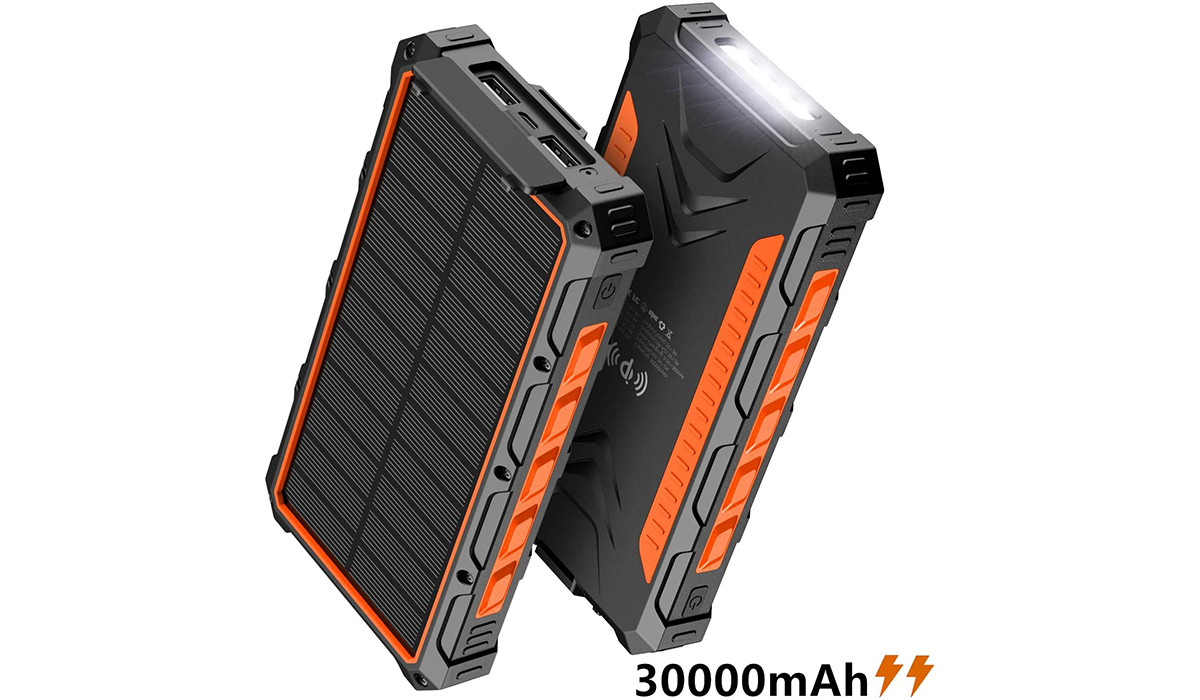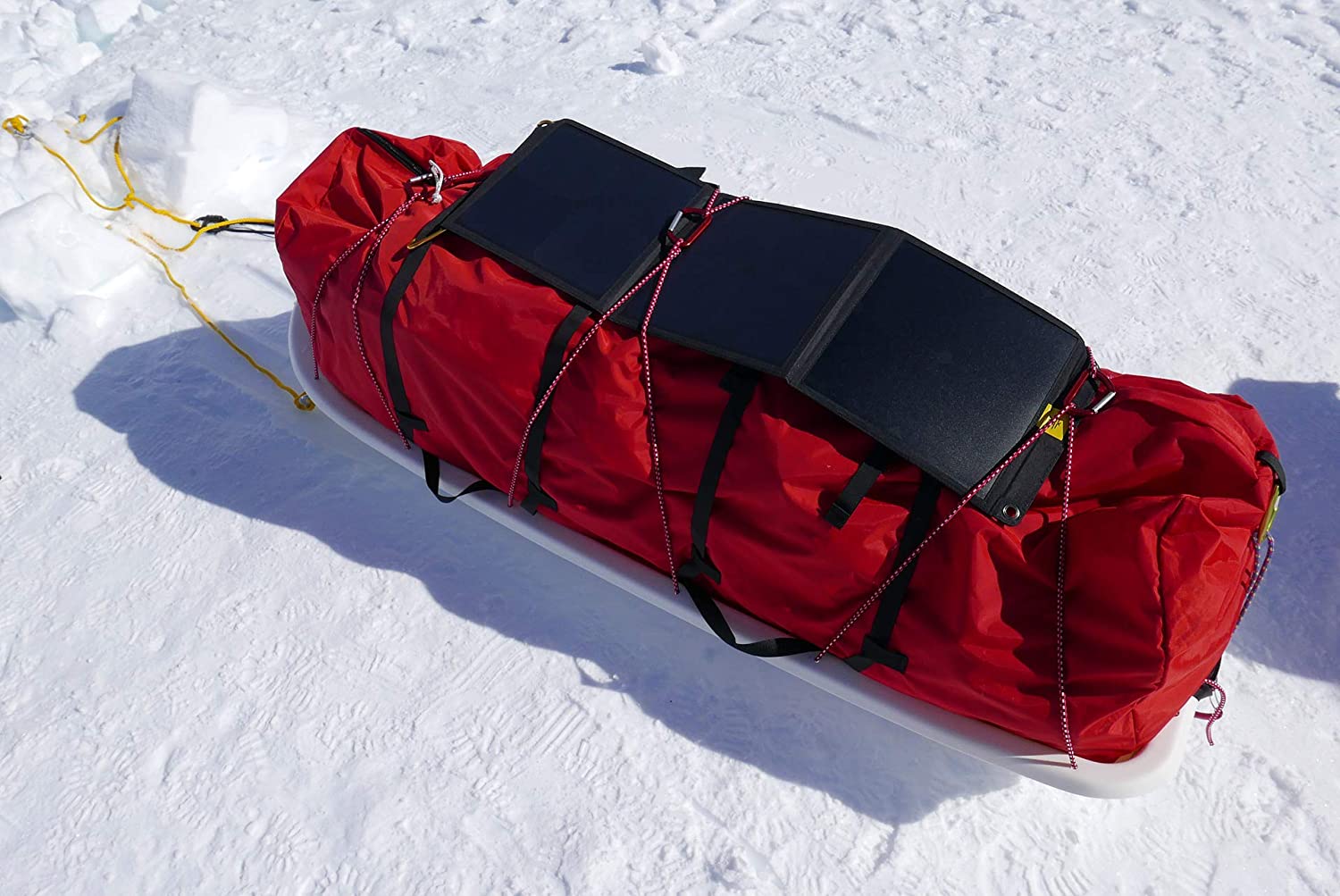Luke Cuenco 05.28.21
With modern problems come modern solutions. I know many of us try to get away from the house and the city and leave all of our technology behind. However, despite our best efforts, technology seems to always follow us wherever we go. On the converse side, a lot of the technology that we carry with us can be incredibly helpful and provide an extra layer of safety and comfort on long journeys in the wilderness or even just keep the tunes going during a day out on the lake. Solar chargers are one of the best ways to keep your devices charged up and in usable condition while out in the wild when traditional sources of power aren’t available. The best portable solar chargers on the market may shock you… But at least you’ll get a charge out of them. All puns aside, a way to power up your devices wherever you are is something you should take seriously when planning an adventure.
Table of Contents
1. BioLite SolarPanel 5+ – Editor’s Pick
Probably one of the most comprehensive options out there on the market, the BioLite SolarPanel 5+ does two things for you. Not only does the SolarPanel 5+ lets you tap into the sun, it also stores up to 2200mAh (about half the storage of a Samsung Galaxy S20 Ultra) of onboard energy storage meaning you can top off your cell phone, GPS, or Sat phone without having to worry about being completely stuck without a ready source of power. The battery has a maximum output of 5W (5 volts at 1 amp).
The SolarPanel 5+ features an integrated sundial to help you optimize the panel for efficient charging. The integrated 360-degree stand also helps with this and allows you to place the panel on uneven terrain and leave it to charge while you set up camp or make breakfast. Best of all, it features a USB in and USB out meaning you can charge the SolarPanel 5+ at home or in the car on the way to your next adventure and leave with a completely full power bank. The BioLite SolarPanel 5+ weighs 13.76 oz and is available for $89.99
Pros/ Integrated Battery is an amazing feature not many other solar chargers have basically two devices in one
Cons/ 5W of output isn’t very much but it will at least keep you topped off if you’re patient
Bottom Line/Great to bring along as a power bank with solar charging capabilities
2. BEARTWO Ultra-Compact Solar Power Bank – Budget Pick
The BEARTWO is an ultra-compact, ultra-light solar charging power bank. The BEARTWO is billed as being waterproof and dustproof so this one would be perfect for taking on your most rugged adventures. The BEARTWO features an onboard emergency flashlight, battery charge indicator and 10,000mAh of battery capacity.
The BEARTWO produces 5v/2.1A of power at a time. It’s perfect for a single power-hungry device but it can support two devices at a time at a reduced charging rate. Charge time from a dedicated grid-power source is about 5 hours and the solar charging capabilities will take about 40 hours on a full charge – so it’s probably best to charge this one in the car or at home and leave the solar charger as a means of topping the power bank up. The BEARTWO Ultra-Compact Solar Power Bank is available for $19.98 making it the most budget friendly option on this lst.
Pros/Affordable, durable and good battery life
Cons/Solar charging is extremely slow because of the small photocell area
Bottom Line/Great if you plan on leaving the charger on your backpack or back at the campsite in full sun – durable to follow you through almost anything
3. BigBlue 28W USB Solar Charger
The BigBlue 28 USB Solar charger is one of the best on the market if the current reviews are to be believed. You read that right in the heading – 28 Watts. With a staggering amount of power output in optimal conditions, you can charge several devices simultaneously using the BigBlue’s 3USB ports. Many online reviews also state that the charger works very well with its 4 panels in even cloudy conditions.
The BigBlue Solar charger packs up into a fairly compact package for storage inside a backpack, however it is a little on the heavy side at 1.3 pounds. The Big Blue Solar Charger can handle most devices; however, it can’t handle the much larger iPad pro (I don’t know why you’d want to bring one of those with you on a backpacking trip anyway!). The BigBlue 28W USB Solar Charger is available for $53.91.
Pros/Great power output and can charge multiple devices at the same time
Cons/Heavy, and doesn’t feature an integrated power bank for storing energy
Bottom Line/Great for multiple users or devices when sunny conditions can be expected
4. QiSa Solar Power Bank
If you’re going to be in an area with cell phone reception and like to watch videos or movies as you drift off to sleep then the QiSA solar Power bank may be the one for you. The Solar bank has a lot of features that make it great for a backpacker or hiker who wants to stay slightly connected. The QiSa one of the largest solar power banks on the market with a whopping 32,800 mAh battery – more than enough to charge the previously mentioned Galaxy S21 Ultra over 7 times on a single charge.
The QiSa also features two USB ports, an inductive charger for your phone and an onboard LED flashlight with an SOS mode for emergency signaling. The QiSA also comes with a IP66 Rating meaning it should be safe from water and dust exposure out on the trail. The QiSA Solar Power Bank is available for around $50.
Pros/Great Storage capacity, great durability
Cons/Heavy; Not the fastest charging unit and not compatible with some phones and tablets
Bottom Line/Perfect for trips over a couple of days or serves as a good emergency backup with solar charging capabilities
5. PowerTraveller Falcon 40
This thing is an absolute beast. Boasting the most power output of any of the chargers on this list, the Powertraveller Falcon 40 can produce up to 40-Watts, and 20V DC output. With the generous inclusion of several different power adapters, the Falcon 40 can charge any laptop, smartphone, or DSLR camera if you have some sunlight.
The Falcon 40 is not surprisingly the largest solar charger on this list but that is to be expected given its power output. Even though the Falcon 40 is large, it is still both splash-proof and durable enough to come along with you on your adventures, but it will come at a price. The PowerTraveller Falcon 40 is normally listed for $259.99, but we found a better deal.
Pros/Best power output on the market; Can charge everything from laptops down
Cons/Exceptionally large, takes up a lot of space and is extremely expensive
Bottom Line/Probably best suited for the most hardcore adventurers out there who are doing some serious work off-grid
Charging your phone
A solar charger will typically take about 20-30 hours to fully charge a modern smartphone. The biggest limitation of portable solar charging panels is the amount of power they can generate. This is compounded by environmental factors such as dust on the panels as well as the amount of available sunlight. Generally speaking, the larger the panels, the larger the output.
It’s a better idea to either use a portable solar charger with a built-in battery pack, or use a portable battery pack with your solar charger. After all, you don’t want to sit around all day waiting for your phone to charge, and unless you have a long cord, the direct exposure to sunlight needed for the solar panel to work is usually not that great for cell phones.
A word about direct sunlight
Do Solar Chargers Need Direct Sunlight? The short answer is no, you don’t. The solar panels on most chargers should be able to collect some energy even without direct sunlight. For portable solar chargers with charging indicators built in, you can observe this even if you are in a shady area on a sunny day.
Direct sunlight is always best for the most efficient charging but unless you want to reposition the panel every hour you should be able to get a decent charge by leaving it out in an open area facing straight up.

Solar panel life expectancy
Solar panels used to be both extremely inefficient and didn’t last very long. Advances in technology have allowed improvements and you can expect any solar charger you buy these days to last around 25 years or so. This is provided that you keep the panels in good shape and don’t damage any of the electronics inside the unit – this is why it’s a good idea to consider the level and type of activity you’re planning on doing during your trip.
How do I pick a portable solar charger?
Look at the amount of energy it produces and see if it meets your needs. The smaller, less expensive models are usually good for cell phones, but if you need to charge a laptop or other big device, go with one that produces more electricity.
Will a solar charger hurt the life of my battery?
In short, not usually. Most portable solar chargers produce a slow charge with a very low voltage. This can mean it takes longer to charge your device, but the effect shouldn’t hurt your battery. Always check your requirements and manuals to be sure, though.
We are committed to finding, researching, and recommending the best products. We earn commissions from purchases you make using the retail links in our product reviews. Learn more about how this works.
